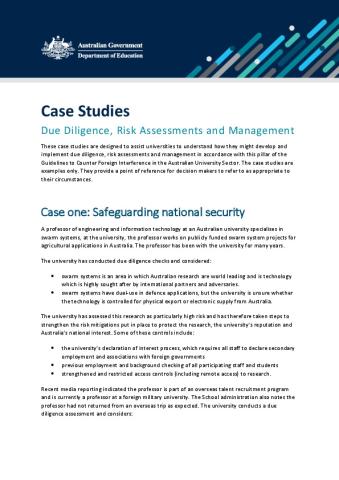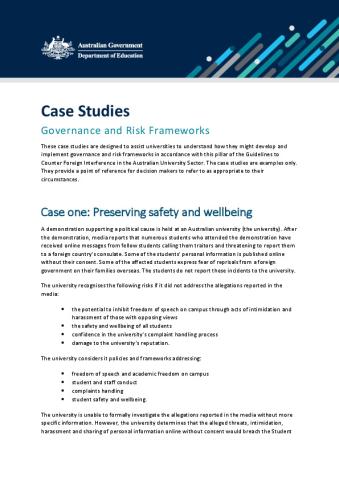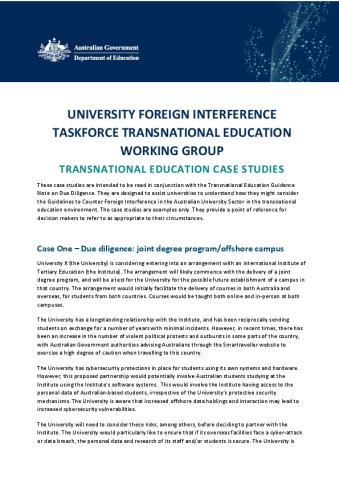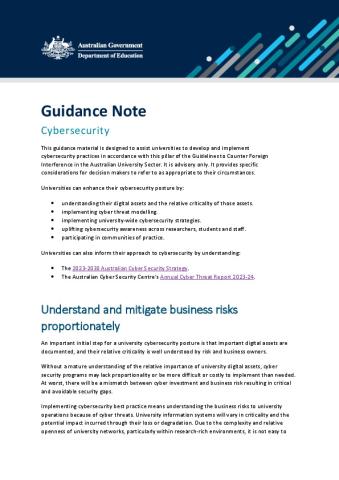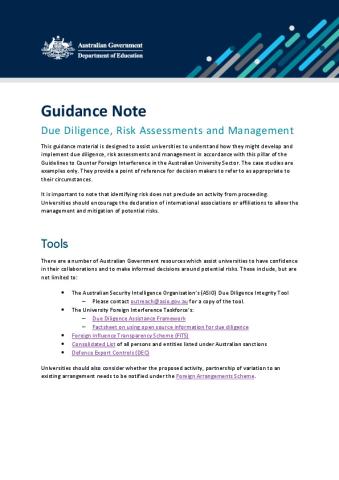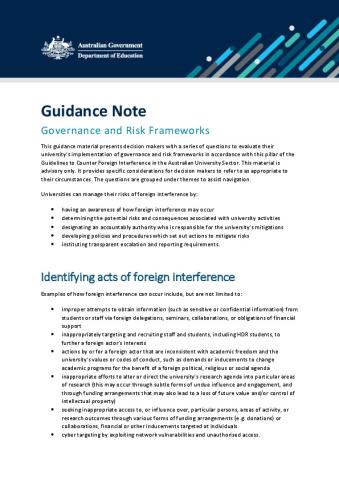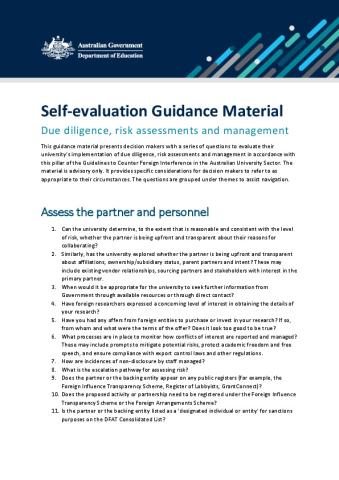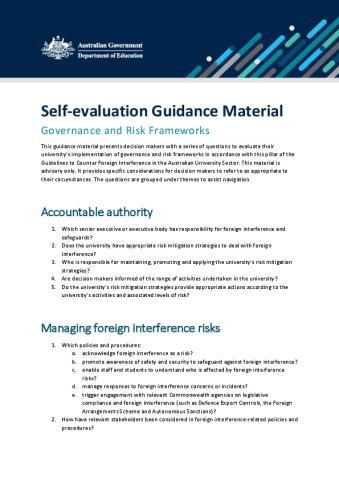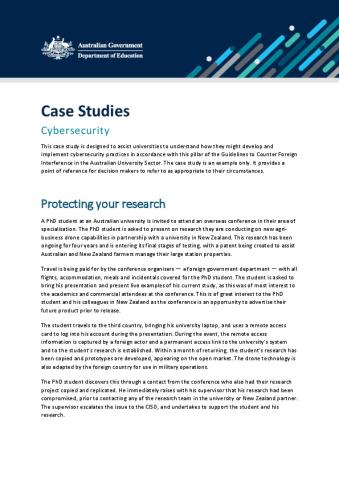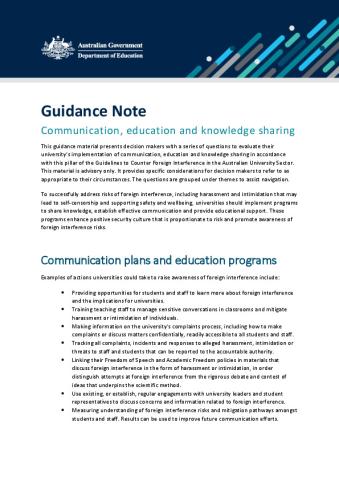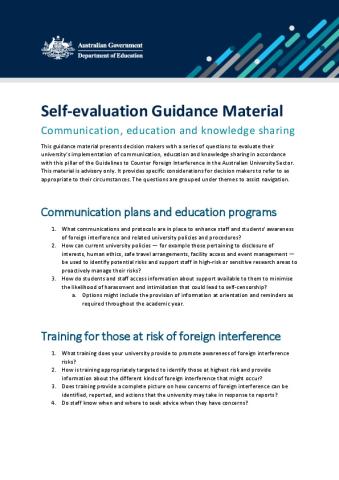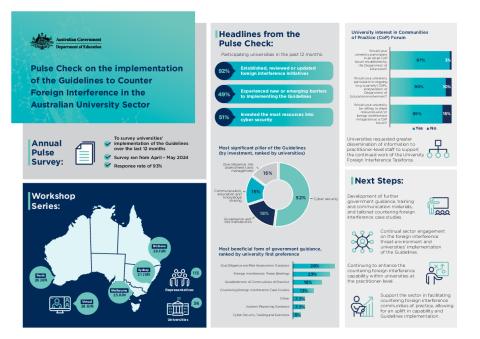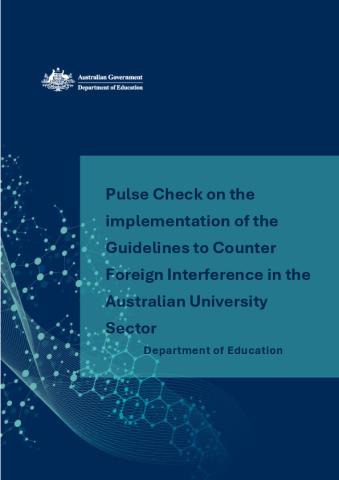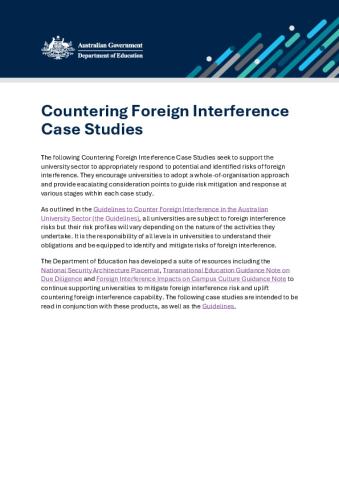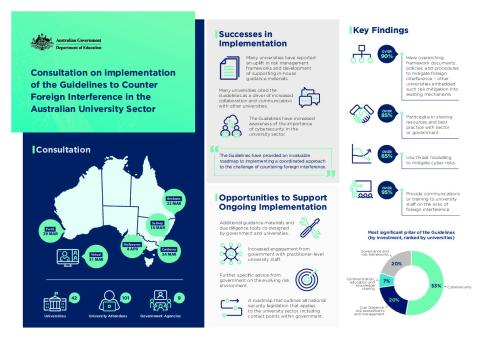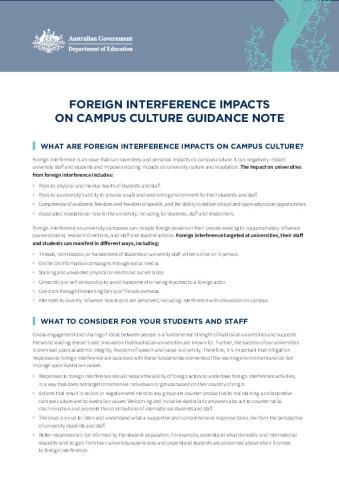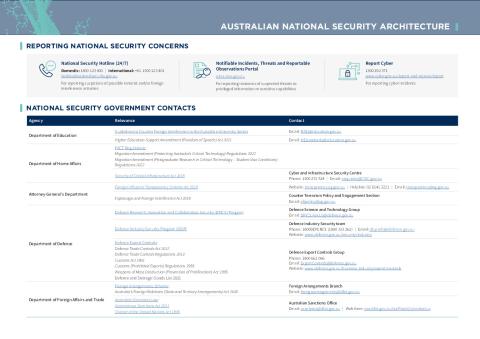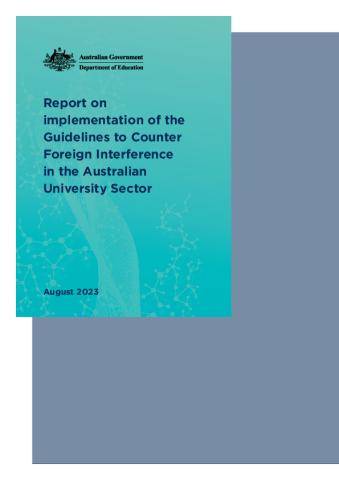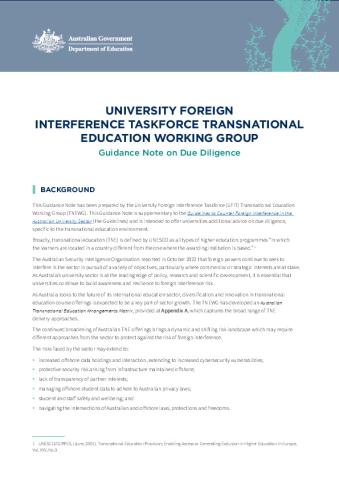Resources
Case Studies: Due diligence, risk assessments and management
These case studies are designed to assist universities to understand how they might develop and implement processes for due diligence, risk assessments and management in accordance with the Guidelines to Counter Foreign Interference in the Australian University Sector. The case studies are examples only. They provide a point of reference for decision makers to refer to as appropriate to their circumstances.
Case studies: Governance and risk frameworks
These case studies are designed to assist universities to understand how they might develop and implement governance and risk frameworks in accordance with the Guidelines to Counter Foreign Interference in the Australian University Sector. The case studies are examples only. They provide a point of reference for decision makers to refer to as appropriate to their circumstances.
Case studies: Transnational Education
These case studies are intended to be read in conjunction with the Transnational Education Guidance Note on Due Diligence. They are designed to assist universities to understand how they might consider the Guidelines to Counter Foreign Interference in the Australian University Sector in the transnational education environment. The case studies are examples only. They provide a point of reference for decision makers to refer to as appropriate to their circumstances.
Guidance note: Cybersecurity
This guidance material is designed to assist universities to develop and implement cybersecurity practices in accordance with the Guidelines to Counter Foreign Interference in the Australian University Sector. It is advisory only. It provides specific considerations for decision makers to refer to as appropriate to their circumstances.
Guidance note: Due diligence, risk assessments and management
This guidance material is designed to assist universities to develop and implement processes for due diligence, risk assessments and management in accordance with the Guidelines to Counter Foreign Interference in the Australian University Sector. It is advisory only. It provides specific considerations for decision makers to refer to as appropriate to their circumstances.
Guidance note: Governance and risk frameworks
This guidance material is designed to assist universities to develop and implement governance and risk frameworks in accordance with the Guidelines to Counter Foreign Interference in the Australian University Sector. It is advisory only. It provides specific considerations for decision makers to refer to as appropriate to their circumstances.
Self-evaluation: Due diligence, risk assessments and management
These case studies are designed to assist universities to understand how they might develop and implement processes for due diligence, risk assessments and management in accordance with the Guidelines to Counter Foreign Interference in the Australian University Sector. The case studies are examples only. They provide a point of reference for decision makers to refer to as appropriate to their circumstances.
Self-evaluation: Governance and risk frameworks
This guidance material presents decision makers with a series of questions to evaluate their university’s implementation of governance and risk frameworks in accordance with the Guidelines to Counter Foreign Interference in the Australian University Sector. The material is advisory only. It provides specific considerations for decision makers to refer to as appropriate to their circumstances.
Case Study: Cybersecurity
This case study is designed to assist universities to understand how they might develop and implement cybersecurity practices in accordance with the Guidelines to Counter Foreign Interference in the Australian University Sector. The case study is an example only. It provides a point of reference for decision makers to refer to as appropriate to their circumstances.
Guidance note: Communication, education and knowledge sharing
This guidance material is designed to assist universities to develop and implement communication, education and knowledge sharing in accordance with the Guidelines to Counter Foreign Interference in the Australian University Sector. It is advisory only. It provides specific considerations for decision makers to refer to as appropriate to their circumstances.
Self-evaluation: Communication, education and knowledge sharing
This guidance material presents decision makers with a series of questions to evaluate their university’s implementation of communication, education and knowledge sharing in accordance with the Guidelines to Counter Foreign Interference in the Australian University Sector. The material is advisory only. It provides specific considerations for decision makers to refer to as appropriate to their circumstances.
Pulse Check on the implementation of the Guidelines Placemat
The Placemat is a one-page summary of the 2024 consultation process and key findings from the Pulse Check on the implementation of the Guidelines to Counter Foreign Interference in the Australian University Sector. It highlights the successes in universities’ implementation to date while identifying opportunities for further work.
Pulse Check on the implementation of the Guidelines to Counter Foreign Interference in the Australian University Sector
The Pulse Check on the implementation of the Guidelines to Counter Foreign Interference in the Australian University Sector (Pulse Check) highlights the extensive work universities have undertaken to actively engage and implement the Guidelines to Counter Foreign Interference in the Australian University Sector.
The Pulse Check was informed through consultation with universities, sector representatives and Government agencies, including an Annual Pulse Survey and Countering Foreign Interference Workshop Series. For a summary of the consultation, please see the Pulse Check on the implementation of the Guidelines Placemat.
Countering Foreign Interference Case Studies
In 2024, the department invited all 42 Australian universities to participate in an Annual Pulse Survey and Countering Foreign Interference Workshop Series. Respondents and attendees welcomed further guidance from Government on how to identify and respond to incidents of foreign interference.
The Countering Foreign Interference Case Studies seek to support the university sector to appropriately respond to potential and identified risks of foreign interference. They encourage universities to adopt a whole-of-organisation approach and provide escalating consideration points to guide risk mitigation and response at various stages within each case study.
Consultation on implementation of the Guidelines Placemat
The Placemat is a one-page summary of the consultation process and key findings from the Report on implementation of the Guidelines to Counter Foreign Interference in the Australian University Sector. It highlights the successes in universities’ implementation to date while identifying opportunities for further work to support implementation.
Foreign Interference Impacts on Campus Culture Guidance Note
In 2023, the University Foreign Interference Taskforce Training Working Group hosted workshops led by the Department of Home Affairs. Attendees discussed how to raise awareness of the impact that foreign interference has on campus culture; and report concerning behaviour. This included best practice in student complaint management, and university reporting and response.
The Department of Education has collaborated with Home Affairs to develop the Guidance Note which highlights the key takeaways from the workshops. The Guidance Note provides a framework outlining key actions, behaviours or responses universities could consider in order to combat foreign interference on campus. The Guidance Note is intended to support and build on existing work of universities and government to mitigate foreign interference threats.
National Security Architecture Placemat
The National Security Architecture Placemat was developed by the Department of Education in consultation with Australian Government agencies. The Placemat assists universities in understanding the national security obligations that may apply to them, and appropriate contact points and reporting mechanisms for concerns.
Report on implementation of the Guidelines to Counter Foreign Interference in the Australian University Sector
The Report highlights the extensive work the university sector has undertaken to implement the Guidelines to Counter Foreign Interference in the Australian University Sector. The Report was informed by a consultation with universities, sector representatives and government agencies.
For a summary of the consultation, please see the Consultation on implementation of the Guidelines Placemat.
Transnational Education Guidance Note on Due Diligence
The Transnational Education Guidance Note on Due Diligence has been prepared by the University Foreign Interference Taskforce (UFIT) Transnational Education Working Group (TNEWG). The document offers universities additional advice on due diligence, specific to the transnational education environment.
Enhancing Cyber Security Across Australia’s University Sector: Final Report
In May 2020, the then Minister for Education allocated $1.6 million in funds from the 2019-20 Enabling Growth and Innovation (EGI) Program to enhance cyber security across Australia’s university sector.
In June 2020, RMIT University commenced delivery of the Enhancing Cyber Security Across Australia’s University Sector project (the Project).
The Project formally concluded on 31 December 2022, with RMIT University delivering the Project’s Final Report.
Training resources include blueprints, handbooks, and self-assessment tools to enhance the university sector’s specific capabilities and resilience, to mitigate threats and respond to incidents in alignment with government and industry regulations.
Access to training resources can be requested by emailing the RMIT team at enhancing.cybersecurity@rmit.edu.au from a university-provided email.

